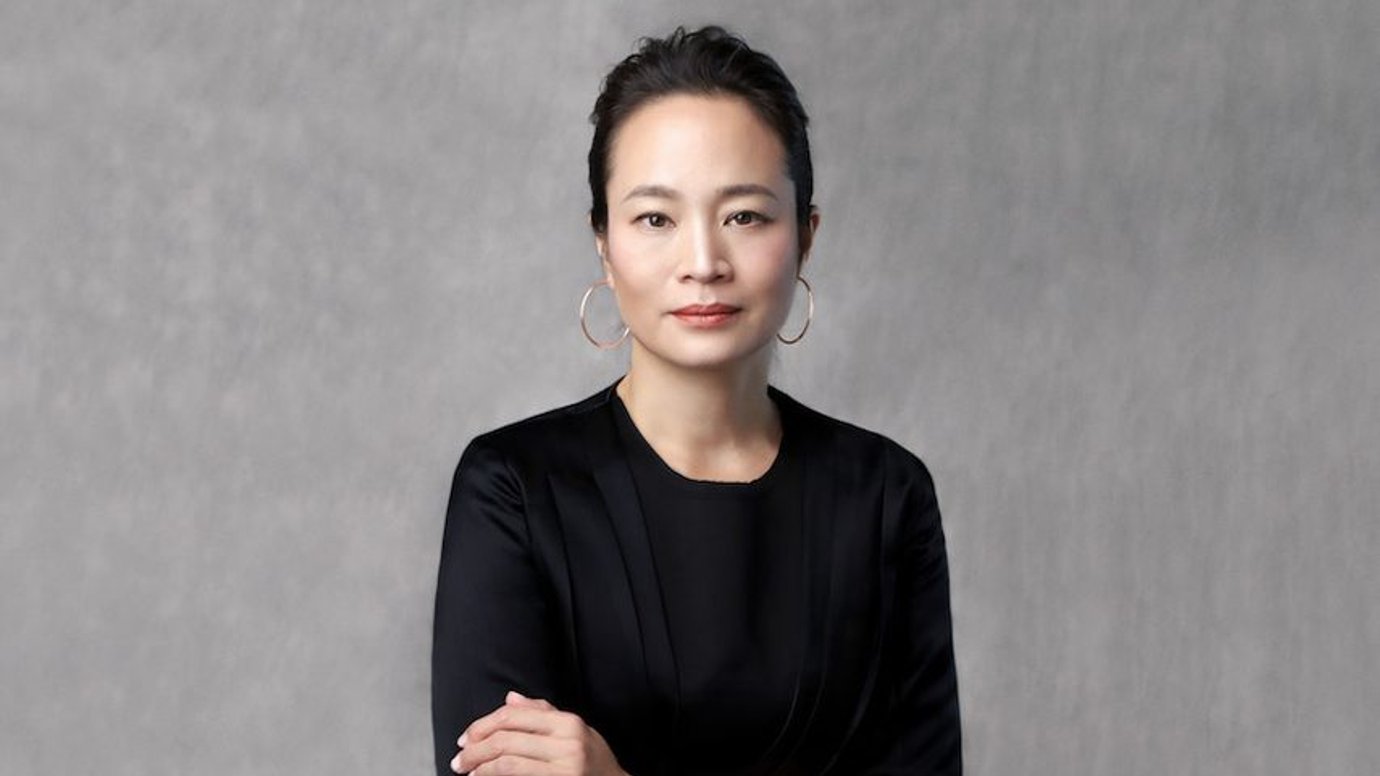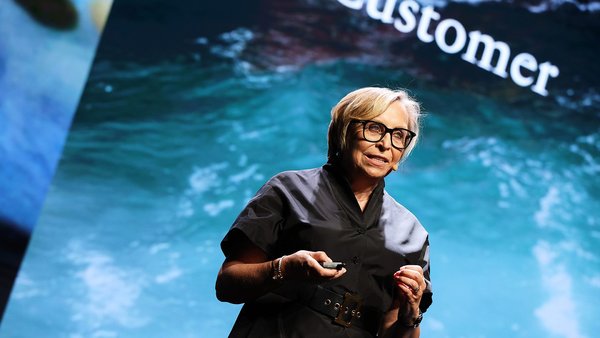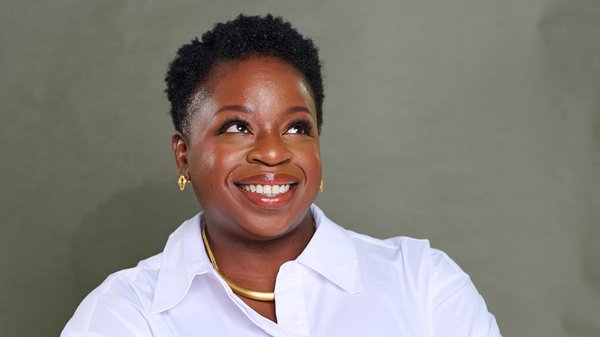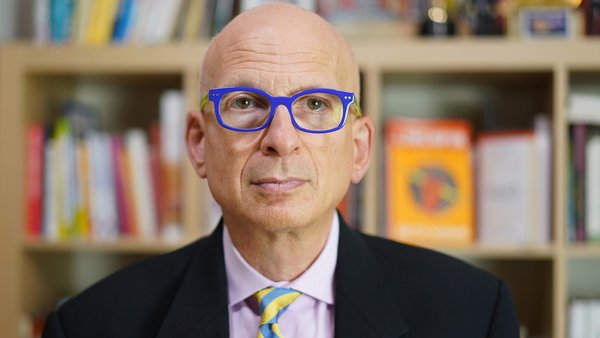‘AI is only a wonderful tool you can use, it cannot replace the hard work that people have to put in’ /
Publicis Groupe’s Jane Lin Baden on why the best work should move the whole business and what Creative Business Transformation really means in 2025

After awarding AXA with the Grand Prix for the Creative Business Transformation Category at the Cannes Lions Festival for Creativity 2025, jury president Jane Lin Baden sat down with Contagious to discuss the evolution of this year’s category, how the work was scrutinised, and what future of the category could look like.
Announcing the winner at the Creative Business Transformation press conference, the Publicis Groupe chief executive officer, Asia Pacific, praised AXA’s Three Words campaign for being a ‘simple, powerful idea with maximum transformative power’. It's a theme Lin Baden expands on in the interview when discussing a trend for low-tech business transformation wins in this year’s category.
This year’s top work had to be more than creatively sharp. It needed to drive real change across the business and have the potential to last, not just create short-term noise. The jury paid close attention to how AI was used, expecting it to deliver meaningful impact. As jury president Lin-Baden put it, the bar was clear: no AI for AI’s sake
How has the Creative Business Transformation category evolved this year?
Jane Lin Baden: The work this year has a new element – if you look at the work in the past, they’re all amazing, but they are less about the entire ecosystem. All of the [campaigns in] the shortlist here, and many beyond the shortlist, have been chosen because they activate the entire ecosystem [of the business]. It’s not just about having a new product. Brands have to mobilise, they have to negotiate, they have to change the internal operation. We feel that’s going to be gradually important for transformation to happen, you have to mobilise the entire ecosystem, because it’s not just any more about a marketing campaign. It is about the organisation, us moving from marketing into a business pillar.
The second thing that we discussed is that there are many very good entries, and they look like a long-term transformation, [they have a] long-term impact, but we don’t feel they are transformative anymore. They have a good impact but they are not evolving for the new generation. We feel that in this category, when we choose the work, we have to think about the future. Not only are they good today, we have to think about how they can change the category in the future. I do think some of the work we have today has the potential to change the category but also redefine this Lion to be much more holistic for the entire ecosystem.
There was some work that everyone loved, but then we paused, we said, ‘Can you imagine that the long-term impact will go beyond two years, three years?’ If not, then we didn’t put them into the shortlist.
How did the jury separate great creative from real business impact?
We did lots of forensic work. Everything in Cannes Lions is about creativity so there’s actually nothing novel about creativity. It has to be there. We checked every single work for whether it was core to the business. When we say business, it’s not only about selling the product it’s about the organisation.
Bear in mind this is the category talking about mobilising internally versus only just externally with the customer and so on. We checked how close it is to the business versus only being a marketing concept.
How did AI play into discussions among his year’s jury?
Everyone is talking about AI, but in this jury we took a little bit more of a conservative view towards AI, almost that you don’t want to see AI laziness. Sometimes you feel like [work} is amazing because of AI, and then all of a sudden, it’s becoming lazy because we don’t have more work getting to the insight, we don’t actually change the operation just because we have an AI idea.
You will see [in] the winners there’s no single work that says this is AI driven – even in the shortlist there are very, very few. The jury was very careful [thinking] about what role exactly AI is playing in winning. Is AI replacing everything? Or is AI only a tool? Are we amplifying AI because it’s a very sexy word – you see the laziness there. We feel that AI is not the transformation, AI is only the wonderful tool you can use. It cannot replace the hard work that people have to put in.
The biggest impact came from simple ideas. What does that say about the role of complexity in driving change?
What we liked is that you don’t do a lot extra, but you use what you have to create much more. AXA is using what they have – which is a contract. They didn’t launch a new product, there’s consistency, they’re just adding a new element and all of a sudden they beat all of the category.
In this category, when we think about using what you have and then using a new lens to look at what you have, you can create a new utility that can change the category.
Much of the winning work was purpose-led but also delivered business results. Was that balance a key factor for the jury?
That’s absolutely one of the critical points that we discussed. We call it the evolution of purpose. Historically there has been lots of purpose-driven work but the problem is that it’s not even close to the brand, not to mention close to the business. You can be close to the brand by saying this is a brand’s tonality and propositions, but close to the business, that means you have to change your business in order to deliver that purpose.
So, for example, AXA, it’s a contract and it’s very core to insurance. But when you think about household insurance, you think about water, fire and so on. That’s violence against your house but [to cover] violence against the people in the house, that’s where we feel they have redefined household insurance.
It’s the same with Backing the Bars for example, Heineken is helping their end customers by helping their business. It’s done in a very different way, Heineken is not selling anything but they are sustaining their customer because they are its long-term life blood. You have to do this otherwise you don’t have the right to say you’re running out of businesses in the future.
The evolution of purpose is becoming much more sophisticated, it is not decorative, it's not an accessory, it’s very core to the business operation, which we liked a lot.
What convinced the jury that AXA’s campaign deserved the Grand Prix?
We were amazed by the business side of this case. They changed the contract, not only for the future, they did it retroactively, which is a massive legal process to go through. So the business element we feel is super solid for the operation and the transformation is definitely benefiting the brand, because as the brand grows, the business grows. It is a very transformative way of using their business.
Cheetos stood out for not leaning on purpose — what made it Bronze-worthy?
We love this campaign. If you look at the subcategories this is under the long-term brand platform [category]. Typically because of the definition of that category you have entries that really talk about brand versus ecosystem mobility. To credit that sub-category we think that it’s important to call [Cheetos] out.
We don’t see Cheetos change the ecosystem and Cheetos is also not having any evolution of purpose, but if you look at the long-term brand platform the work has stood for 10-20 years with amazing success. We believe Cheetos are evolving themselves, that evolution is very important to marketing. We have to adapt to evolve. We cannot rely on the same platform without evolution. Where Cheetos starts versus this campaign they launched, it’s very different. They changed the target audience, they changed the segment, they have a business problem to solve because they evolved their brand platform but they are still staying very true to it.
What do you expect to have the biggest impact on the category in the year ahead?
We want to see this work [integrated] into the entire ecosystem because if you want to mobilise the entire system that means the company needs to show that through how they change the internal organisation. Society needs mobilisation, so the work needs to show the power of mobilising the resources around the company, around what they want to do.
Want more of the same? /
We don’t just write about best-in-class campaigns, interviews and trends. Our Members also receive access to briefings, online training, webinars, live events and much more.







